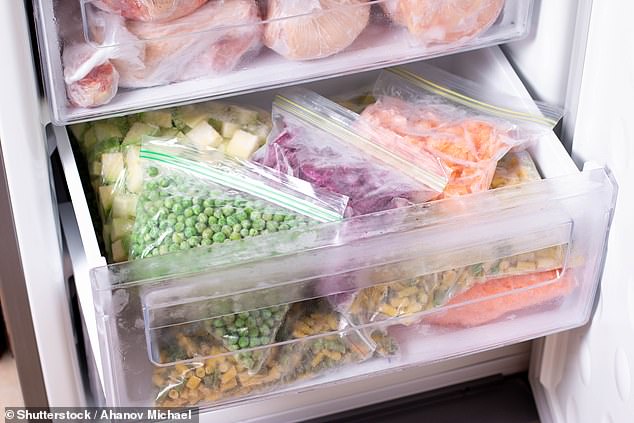[ad_1]
Whether it’s last night’s pizza leftovers or bananas that are on the turn, freezing food is a brilliant way to reduce waste.
But not all items can be popped in the icebox, experts have warned.
While it’s a handy way to store a large range of products, certain foods will be spoiled if they get too cold.
‘Some foods can’t cope with being frozen without the quality being affected,’ a team from Which? said.
‘They might become watery, limp and unpleasant to eat.’
Popular foods that can be frozen include bread, meat, cheese, milk, mushrooms and cooked rice.
‘Most foods can be frozen as long as they’re still in date,’ the experts said. ‘However, some will deteriorate or separate in the process.’
So, are you guilty of making these freezer faux pas?

Putting food in the freezer is a great way to avoid waste – but there are some items that will spoil if they’re put in sub–zero temperatures, experts have warned (stock image)

Freezing fried food like tempura prawns (pictured) will likely result in a soggy mess upon defrosting (stock image)
1. Fried or oily food
If you’ve made too much fried chicken, or have some leftover tempura–battered prawns, it might be tempting to pop them in the freezer.
However, freezing fried food will likely result in a soggy mess upon defrosting due to the moisture and oil distribution.
While frozen store–bought items like French fries are often designed to handle freezing, any homemade versions will lose their original crisp texture.
2. Hard–boiled eggs
While they’re useful for making sandwiches, it’s best not to hard–boil too many eggs in advance as they can’t be frozen, experts say.
Putting them in the freezer will make the egg whites go tough, rubbery and watery when thawed.
However, you can freeze hard–boiled egg yolks for later use, as long as a small amount of salt or sugar is mixed in to prevent a gel–like texture.

While you can freeze hard–boiled egg yolks, the whites will go tough, rubbery and watery if they’ve been in the freezer (stock image)

Putting cucumbers or lettuce – which have a high water content – in the freezer can make them go mushy and lose their telltale crunch (stock image)
3. Vegetables with a high water content (such as cucumber or lettuce)
One of the best things about vegetables is their telltale crunch.
But putting the likes of cucumber or lettuce in the icebox can turn them to mush once they’re thawed again.
The only time freezing these products could work is if you plan to use them in soups, smoothies or dips, where a crunchy texture isn’t required.
4. Yoghurt and single cream
While you can freeze yoghurt its texture will likely change upon thawing, becoming icier, separated or more watery.
For those who enjoy a creamy mouthfeel, this won’t be very pleasant.
Similarly, the texture of single cream may become slightly grainy or separated once it has defrosted, making it best suited for cooking, soups or sauces rather than whipping.

It’s best to keep yoghurts in the fridge, if possible, as they’re likely to go icy, separated or watery once they’ve been defrosted (stock image)

It’s fine to freeze hard cheese – especially if grated – but soft cheese such as brie, feta and cream cheese won’t last well if frozen (stock image)
5. Soft cheese
According to Which?, while hard cheeses can withstand freezing conditions and last well up to two months in the freezer, freezing soft cheese is not a good idea.
‘It’s safe to freeze soft cheese, but this is not recommended as it ends up very watery when defrosted,’ they said. ‘This includes cheeses such as brie, feta and cream cheese.
‘That said, if you have soft cheese in a recipe – such as a pasta sauce – this will freeze much better.’
The researchers said that most foods that are suitable for freezing will say so on the label and you can freeze pre–packed food up to its use–by date.
‘If you freeze it any later, the risk of food poisoning increases,’ they said.
When it comes to defrosting, they say moving food to the fridge is the safest option – especially for high–risk products such as milk or chicken.
[ad_2]
This article was originally published by a www.dailymail.co.uk . Read the Original article here. .

